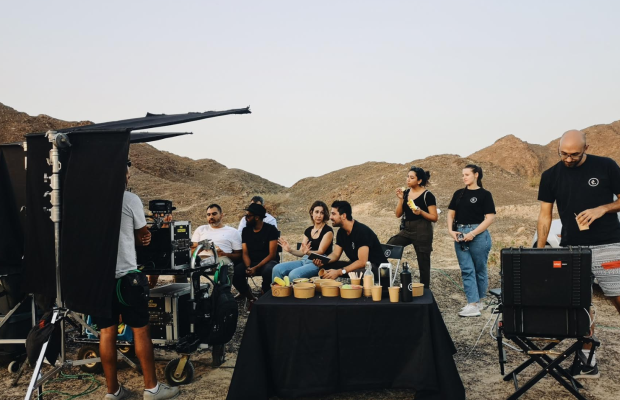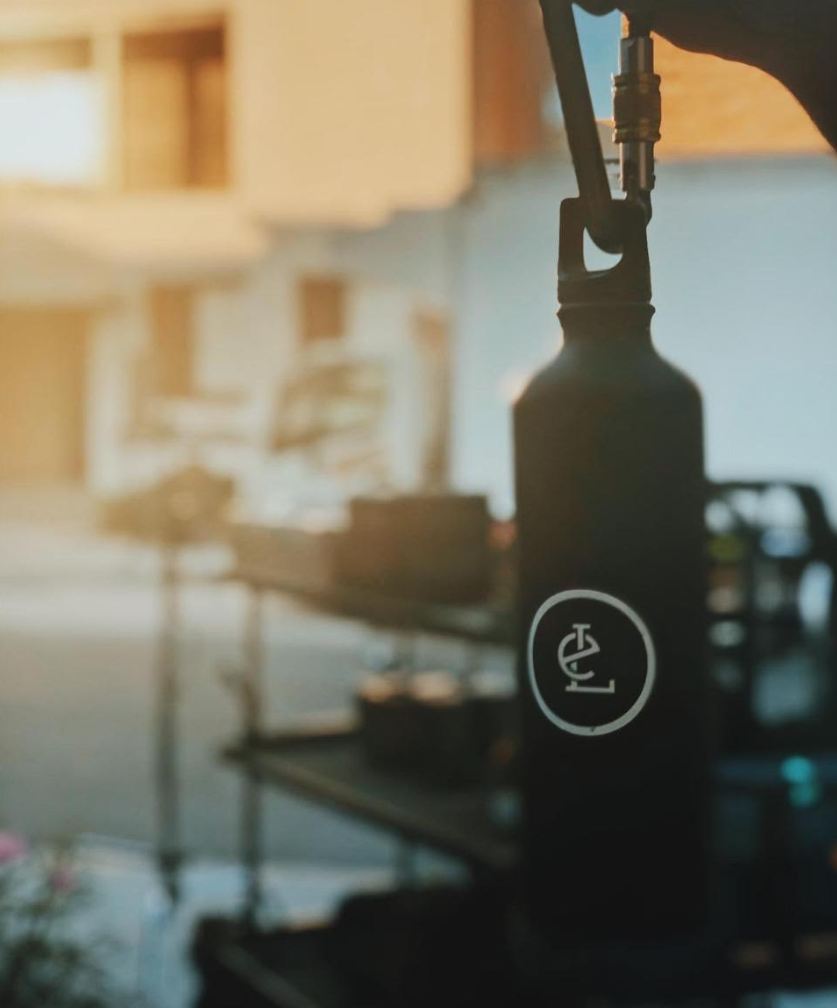
Building a Sustainable Set with electriclimefilms

For the past ten years, electriclimefilms have been producing some of the Middle East’s most memorable ads. But, like many of us, the company is asking itself serious questions about its impact on the environment, particularly in the travel and single-use heavy production industry.
To find out how the company is putting a focus on carbon-neutral and zero-waste policies on set, LBB’s Adam Bennett spoke to head of production Rory Cavanagh and creative director Damiano Fieramosca.
LBB> For how long have you guys prioritised creating a sustainable film set for your projects?
Rory> We’ve been implementing sustainable production for a year now by taking a look at all our filmmaking processes and how we can make them eco-conscious and sustainable.
Damiano> I’m sure everyone that has ever been on any set has, at least once, noticed the seemingly unlimited number of plastic bottles and plates or cutlery that a production goes through in only a few hours. That is probably true for many other work sectors and the problem is that we seem to take this wastage as a necessary by-product. It’s simply the way it is, right? It becomes normal. So it was just a matter of not dismissing what was glaringly and obviously wrong, both in a professional and ethical way.
LBB> And what first pushed you into doing it?
Rory> During a shoot in the Dubai desert we needed to provide water to the cast and crew readily and efficiently. We ended up with numerous empty and half-finished bottles scattered everywhere, and as we were cleaning up we realised what a discomforting image it was to see all that plastic along the roadside and in the dirt. It was a shocking and stark contrast to another shoot shortly after that, in the Mongolian plains, where location fixers were already implementing sustainability. We worked closely with them to make the set plastic-free, as well as separating rubbish for proper disposal after, and preparing all our reference materials to be paper-free. From these eye-opening experiences we learned that we could be sustainable with minimal effort.
Damiano> It’s just the right thing to do. Not only at work but also in our homes. We don’t need to be enlightened or to have some sort of epiphany - just turn on your TV, scroll through your social media, or watch content online - everywhere you look you’ll find people highlighting all sorts of man-made problems. By taking accountability and responsibility, we can make an effort to do what we can to not continue being part of the problem.
LBB> What are some of the things that you do on set to prioritise sustainability?
Damiano> It was about becoming a sustainable company as a whole, in addition to sustainability on set. The process was inside out and we started greening our offices with more immediate solutions: bringing our own mugs and reusable water bottles to the office so we could cut down on paper and plastic waste, sorting recycling into bins, using glassware during meetings instead of disposable cups and bottles, and so forth. Replicating that level of sustainability on set required a bit more planning as it came with challenges.

Above: One of the company's reusable containers
Rory> We try to put into practice three main concerns:
- Reducing plastic waste
- Downsizing reliance on printed materials
- Recycle, reuse, and upcycle where possible
We now always make sure to have large gallons of water dispensers on set (in a very compact and portable setup) as well as provide and encourage the use of eco-friendly cups or reusable water bottles for cast and crew. We try to avoid printing anything where possible - storyboards, call sheets, visual references, etc., are put on tablets for production use as well as sent to everyone before the shoot so that they can access it from their personal devices when on set. We also make a big push to recycle waste, reuse or upcycle props and set elements, and donate whatever we can’t reuse or is leftover.
LBB> What issues, if any, have you encountered as a result of the focus on sustainability, and how have you overcome them?
Damiano> Oh yeah, we had many issues to overcome when we first started thinking about it. Some were practical: where do we find reusable water bottles? How will people carry them around? Where could they get their refill from? How do we keep the dispenser cold? All these details needed to be planned for and we also had to be ready for the possibility that people could just be annoyed by these complications on set. It was the complete opposite though! The crew’s reaction on set was not only positive but everyone was genuinely excited about the idea, proving again that we are all conscious of and sensitive to these kinds of problems. The other thing is of course the cost of it all. Not only does it take effort to be sustainable but it also takes time and resources. Just like eating healthy, or taking extra care of your body is costly, so is being eco-friendly. It is up to each company to decide how important and necessary these expenses are, and whether or not to make them the new standard.
Rory> Change doesn’t happen overnight, and people take time to adjust to it. The majority of our cast and crew welcome it but there are times when some may need time to process and practice doing things a different way than they’re used to. But we’ve only gotten positive feedback thus far and it’s been very encouraging to see everyone being receptive and conscientious as a result of our efforts.
LBB> Looking at the industry in the MENA region generally, do you think enough is being done to promote/combat the climate crisis?
Damiano> Unfortunately, no. Our industry is fast-paced, stressful, and fluctuating. It’s hard to tell people to slow down and even harder to convince them to spend more on something that doesn’t reward them with immediate returns. What is needed is a shift in perception. Unless we start seeing waste and pollution as a serious issue that needs to be avoided at all costs, we will always look to cut corners and turn a blind eye to the problem. But if a change in mindset can happen with individuals then it can naturally progress and expand within industries and institutions.
Rory> It’s absolutely an uphill battle when it comes down to a need to prioritise convenience and efficiency at times. For example, plastic bags are too prevalent and if you don’t have reusable bags on hand then it’s often the only choice available. Sustainable set building is a challenge where sets tend to be broken down and binned as opposed to being reused or repurposed. Improper food and prop/set disposal is also another problem that can be tackled, but it takes time to raise awareness on how best to donate, recycle, or reuse those materials. It takes diligence and time to build the foundation for being sustainable, but the effort is worth it.
LBB> Are there some specific things, looking at the MENA region, that the industry could be doing in order to lessen its environmental impact?
Damiano> There are so many ways we could impact the culture of our community, we just need to find the ones that most resonate with our values. After a production, just doing an evaluation of all the waste that could have been avoided can be eye-opening. Could you have done things better? Do you feel some things could have been avoided? There are many many things that can be implemented industry-wide, some of them difficult and some of them easy - what matters is awareness about these issues. I think the industry needs to ask itself, what image are they projecting, as a company, as a brand, to audiences?
Rory> Looking forward, I think that bringing more awareness and providing more information can contribute to more activism. Even just starting a conversation can help change mindsets. We try to keep communicating and reminding people we work with about how they can help us maintain a sustainable set and as a result lessen our collective environmental impact.
One thing the industry could be doing better though is to make a bigger impact right at the beginning stages of a project. Briefs and concepts in the creative process could be approached with a more sustainable thought process, allowing more consideration towards how to realise a project with as little negative impact as possible.
LBB> Have you found there to be a greater focus on the issue recently, or has there not been much of a change?
Damiano> I tend to be positive about the future. More and more people all over the world are starting to embrace causes worth fighting for. Pollution, excessive consumption of goods, animal cruelty… there have been victories in each of these battles. I believe that with time, as more information is shared, we will find out a way to a common realisation that we need to correct the course of our actions towards, let’s say, a smarter tomorrow. I just hope we can make these corrections before we pass the point of no return. Wouldn’t that be cool of us?
LBB> Given that we're all about changing hearts and minds, do you think that the creative industries have an extra responsibility to be active on this issue?
Rory> Yes, we’re involved in a process that showcases ideas and thoughts through film to a huge platform and collective consciousness. I believe, with this privilege, clients should be responsible for looking at how they can incorporate sustainable considerations into their brand. We really admire the way Volvo, for example, takes a subtle but impactful approach. They utilise their platform not just to sell a product but to also focus on the climate crisis and other environmental issues that are important to them to help raise awareness for it.
LBB> Any parting thoughts?
Rory> Implementing sustainable production practices is not something that happens overnight. It requires constant reminders, problem solving, and evolving and growing. We’re still learning and finding new ways to approach things. Even as individuals we’ve come to find that small personal steps can make a difference and contribute to effecting change. It makes me really proud of my production team and how much we’ve learned along the way, and I look forward to our continued efforts.
Damiano> I want to remind everyone that if we want things to change, then we have to change them ourselves. It’s so easy, almost natural and instinctive to think that it doesn’t matter what we do; what difference does it make if I use less plastic and less paper? After all, I’m only one and seems like my efforts would only be a small drop in a huge ocean. But that is painfully wrong. We meet thousands of people in our lives, we chat with them, we add them on social media, and each of these people will themselves meet and interact with thousands of other people, and so on. So it’s not hard to see a connection here. The ripple effect that our words and actions cause is a real thing, especially nowadays, when we are all constantly connected and wired. Being sustainable is not always the easier choice but it is the right one. It just takes effort - and that’s not asking very much.













